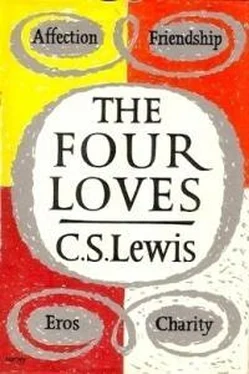The Greeks called this love storge (two syllables and the g is "hard"). I shall here call it simply Affection. My Greek Lexicon defines storge as "affection, especially of parents to offspring"; but also of offspring to parents. And that, I have no doubt, is the original form of the thing as well as the central meaning of the word. The image we must start with is that of a mother nursing a baby, a bitch or a cat with a basketful of puppies or kittens; all in a squeaking, nuzzling heap together; purrings, lickings, baby–talk, milk, warmth, the smell of young life.
The importance of this image is that it presents us at the very outset with a certain paradox. The Need and Need–love of the young is obvious; so is the Gift–love of the mother. She gives birth, gives suck, gives protection. On the other hand, she must give birth or die. She must give suck or suffer. That way, her Affection too is a Need–love. There is the paradox. It is a Need–love but what it needs is to give. It is a Gift–love but it needs to be needed. We shall have to return to this point.
But even in animal life, and still more in our own, Affection extends far beyond the relation of mother and young. This warm comfortableness, this satisfaction in being together, takes in all sorts of objects. It is indeed the least discriminating of loves. There are women for whom we can predict few wooers and men who are likely to have few friends. They have nothing to offer. But almost anyone can become an object of Affection; the ugly, the stupid, even the exasperating. There need be no apparent fitness between those whom it unites. I have seen it felt for an imbecile not only by his parents but by his brothers. It ignores the barriers of age, sex, class and education. It can exist between a clever young man from the university and an old nurse, though their minds inhabit different worlds. It ignores even the barriers of species. We see it not only between dog and man but, more surprisingly, between dog and cat. Gilbert White claims to have discovered it between a horse and a hen.
Some of the novelists have seized this well. In Tristram Shandy "my father" and Uncle Toby are so far from being united by any community of interests or ideas that they cannot converse for ten minutes without cross–purposes; but we are made to feel their deep mutual affection. So with Don Quixote and Sancho Panza, Pickwick and Sam Weller, Dick Swiveller and the Marchioness. So too, though probably without the author's conscious intention, in The Wind in the Willows ; the quaternion of Mole, Rat, Badger, and Toad suggests the amazing heterogeneity possible between those who are bound by Affection.
But Affection has its own criteria. Its objects have to be familiar. We can sometimes point to the very day and hour when we fell in love or began a new friendship. I doubt if we ever catch Affection beginning. To become aware of it is to become aware that it has already been going on for some time. The use of "old" or vieux as a term of Affection is significant. The dog barks at strangers who have never done it any harm and wags its tail for old acquaintances even if they never did it a good turn. The child will love a crusty old gardener who has hardly ever taken any notice of it and shrink from the visitor who is making every attempt to win its regard. But it must be an old gardener, one who has "always" been there—the short but seemingly immemorial "always" of childhood.
Affection, as I have said, is the humblest love. It gives itself no airs. People can be proud of being "in love", or of friendship. Affection is modest—even furtive and shame–faced. Once when I had remarked on the affection quite often found between cat and dog, my friend replied, "Yes. But I bet no dog would ever confess it to the other dogs." That is at least a good caricature of much human Affection. "Let homely faces stay at home," says Comus. Now Affection has a very homely face. So have many of those for whom we feel it. It is no proof of our refinement or perceptiveness that we love them; nor that they love us. What I have called Appreciative Love is no basic element in Affection. It usually needs absence or bereavement to set us praising those to whom only Affection binds us. We take them for granted: and this taking for granted, which is an outrage in erotic love, is here right and proper up to a point. It fits the comfortable, quiet nature of the feeling. Affection would not be affection if it was loudly and frequently expressed; to produce it in public is like getting your household furniture out for a move. It did very well in its place, but it looks shabby or tawdry or grotesque in the sunshine. Affection almost slinks or seeps through our lives. It lives with humble, un–dress, private things; soft slippers, old clothes, old jokes, the thump of a sleepy dog's tail on the kitchen floor, the sound of a sewing–machine, a gollywog left on the lawn.
But I must at once correct myself. I am talking of Affection as it is when it exists apart from the other loves. It often does so exist; often not. As gin is not only a drink in itself but also a base for many mixed drinks, so Affection, besides being a love itself, can enter into the other loves and colour them all through and become the very medium in which from day to day they operate. They would not perhaps wear very well without it. To make a friend is not the same as to become affectionate. But when your friend has become an old friend, all those things about him which had originally nothing to do with the friendship become familiar and dear with familiarity. As for erotic love, I can imagine nothing more disagreeable than to experience it for more than a very short time without this homespun clothing of affection. That would be a most uneasy condition, either too angelic or too animal or each by turn; never quite great enough or little enough for man. There is indeed a peculiar charm, both in friendship and in Eros, about those moments when Appreciative Love lies, as it were, curled up asleep, and the mere ease and ordinariness of the relationship (free as solitude, yet neither is alone) wraps us round. No need to talk. No need to make love. No needs at all except perhaps to stir the fire.
This blending and overlapping of the loves is well kept before us by the fact that at most times and places all three of them had in common, as their expression, the kiss. In modern England friendship no longer uses it, but Affection and Eros do. It belongs so fully to both that we cannot now tell which borrowed it from the other or whether there were borrowing at all. To be sure, you may say that the kiss of Affection differs from the kiss of Eros. Yes; but not all kisses between lovers are lovers' kisses. Again, both these loves tend—and it embarrasses many moderns—to use a "little language" or "baby talk". And this is not peculiar to the human species. Professor Lorenz has told us that when jackdaws are amorous their calls "consist chiefly of infantile sounds reserved by adult jackdaws for these occasions" ( King Solomon's Ring , p. 158). We and the birds have the same excuse. Different sorts of tenderness are both tenderness and the language of the earliest tenderness we have ever known is recalled to do duty for the new sort.
One of the most remarkable by–products of Affection has not yet been mentioned. I have said that is not primarily an Appreciative Love. It is not discriminating. It can "rub along" with the most unpromising people. Yet oddly enough this very fact means that it can in the end make appreciations possible which, but for it might never have existed. We may say, and not quite untruly, that we have chosen our friends and the woman we love for their various excellences—for beauty, frankness, goodness of heart, wit, intelligence, or what not. But it had to be the particular kind of wit, the particular kind of beauty, the particular kind of goodness that we like, and we have our personal tastes in these matters. That is why friends and lovers feel that they were "made for one another". The especial glory of Affection is that it can unite those who most emphatically, even comically, are not; people who, if they had not found themselves put down by fate in the same household or community, would have had nothing to do with each other. If Affection grows out of this—of course it often does not—their eyes begin to open. Growing fond of "old so–and–so", at first simply because he happens to be there, I presently begin to see that there is "something in him" after all. The moment when one first says, really meaning it, that though he is not "my sort of man" he is a very good man "in his own way" is one of liberation. It does not feel like that; we may feel only tolerant and indulgent. But really we have crossed a frontier. That "in his own way" means that we are getting beyond our own idiosyncracies, that we are learning to appreciate goodness or intelligence in themselves, not merely goodness or intelligence flavoured and served to suit our own palate.
Читать дальше











